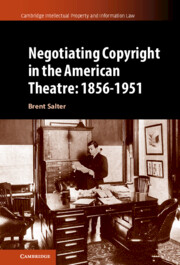(Image source: Cambridge University Press)
The book talk will be in-person (Room 320D, Stanford Law School) and live streamed at the HowlRound website here, on Thursday, May 5, 12:40 – 2:00 PM (Pacific).
To RSVP, click here. Those who confirm their attendance will receive a separate email containing the link to the event.
ABSTRACT
The book is a historical account of how creation is negotiated in the American theatre. It is also about how the American theatre has structured its industry relationships and how industry stakeholders, and in particular dramatists, have responded to these structures through industry customs and collective organization. The research seeks to explain how stakeholders who controlled the transformation of the dramatic work from the playwright’s manuscript to the theatrical stage asserted expansive power over theatrical creation between the mid nineteenth and mid twentieth centuries. These stakeholders (mediators of the American theatre) evolved in different forms: for-profit, nonprofit, and governmental. They included theatrical agents, transnational publishers, producers and managers that emerged and formed combination businesses, and government programs established during the New Deal. Instead of situating copyright law at the center of legal authority structures in the American theatre, the book explores how labor relationships, administrative structures and processes, control over material resources, informal guild expectations and minimum contracts, and other professional norms, all shape how theatre-makers relate cultural production to the more nebulous space of a realized theatrical performance on a stage.
More information can be found here.


No comments:
Post a Comment
Note: Only a member of this blog may post a comment.